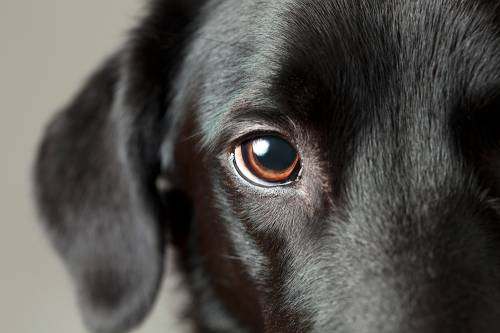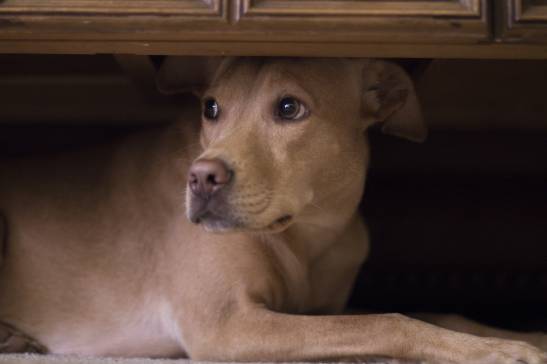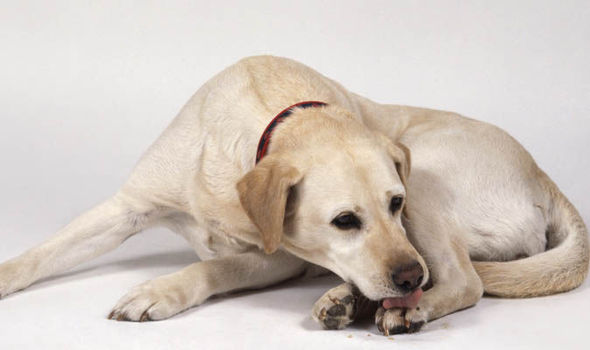Connect with a verified veterinarian in minutes. Licensed vets are available 24/7 to answer your questions. No need to worry about your furry family member.
When your dog is losing hair around his eyes, that makes you very concerned as a pet parent. It’s not normal for dogs to lose the hair near their eyes. However, there are several health problems that can lead to badling around your dog’s eyes.
We’ll review these health issues in the following sections of this article. Let’s get started!
1). Allergies
Dogs, just like us, can suffer from various types of allergies. If your dog’s losing hair around his eyes, it could be due to one or more allergies. He may also show other symptoms such as swollen, red, itchy eyes.
As your dog scratches his eyes, the constant itching may cause him to lose hair around his eyes. Sometimes it’s difficult to determine your dog’s precise allergies. It could be caused by environmental allergies to pollen, air pollution, perfumes and cleaners used in the home, and more. Your dog’s allergies could even be caused by his food.
If your dog is showing these symptoms, along with hair loss around his eyes, then it’s time to call the vet. The vet will treat your dog’s allergies and may advise your dog should be tested to find out what he’s allergic to.
2). Pink Eye
Pink eye, also called conjunctivitis, is another condition that dogs can develop, just like us. This is an itchy condition of the eyes that may cause your dog to scratch and lose hair around his eyes.
Pink eye may be caused by an eye infection, a foreign object in the eye, allergies, and more. You may notice your dog has other symptoms, too, such as puffy, watery, red, and itchy eyes. These symptoms mean your dog needs to see the vet for a diagnosis and treatment.

Review symptoms, medications & behavior to keep your pets healthy with a Vet Online in just minutes.
Ask a Vet Live Now3). Fleas
You wouldn’t think fleas could cause hair loss around your dog’s eyes, but they can definitely be a problem. Fleas can bite your dog anywhere on his body, including his head and face, near his eyes.
What’s more, some dogs are allergic to flea saliva. When the fleas bite, they leave trace amounts of saliva behind. If the dog is allergic to the saliva, then his body will react to the flea bites.
You may notice that he’s got bites on other parts of his body and is scratching furiously most of the time. The bites near his eyes could cause him to scratch and even remove his hair. Your dog may also lick affected areas or develop skin infection where he’s been biting and scratching himself too much.
All of these symptoms mean it’s time to call the vet. Your fur baby needs to find relief from this misery caused by fleas.
4). Ringworm
Ringworm is a type of fungal infection that can lead to loss of hair near the eyes. It’s very contagious and can spread to other pets and the humans in your family.
Ringworm usually isn’t itchy; however, you will notice rings of hair loss on your dog. These may be near his eyes or on other parts of his body.
This fungal infection needs to be treated as soon as possible by the vet before it spreads to everyone and all the pets in your home.
5). Cushing’s Disease
This is a disease that can lead to hair loss in dogs. It’s not something that’s easily cured; in fact, this condition usually requires long-term treatment and care. This health issue is caused when a dog’s body produces too much cortisol, which is a hormone. This is a stress hormone, which controls your dog’s fight or flight response. It also works to control your dog’s weight, keep blood sugar at the right level, and more.
You may notice that your dog is thirstier than normal, that he’s hungry all the time, loses hair that’s slow to grow back, has thinning skin, seems tired and lethargic, pants a lot, and more. If you notice these symptoms, then be sure to get your canine companion to the vet for treatment.
6). Demodicosis
Demodicosis, also called red mange, is a very itchy condition caused by Demodex canis mites. The mites are carried by all dogs; however, in healthy dogs, the numbers stay relatively low. When a dog develops a health issue, it’s possible the mites will grow in number and cause symptoms.
Symptoms you may notice in your dog may include hair loss that progresses from the mouth and eyes to the rest of the body. Your fur baby may also develop skin lesions and sores, which he may scratch or not. This condition can easily spread to the dog’s entire body, and it’s contagious.
7). Dermatitis
Dermatitis in a dog has various causes. However, you may notice symptoms such as hair loss, open sores, your dog is licking the sores and spots, as well as scratching.
If you notice these symptoms in your dog, then it’s time to call the vet. Your canine friend needs to have relief from this itchy, sore condition.
8). Atopic Dermatitis
This is a condition that dogs who have allergies may develop. It can be caused by airborne allergens, which are absorbed into the bloodstream and carried throughout the body. Atopic dermatitis is sometimes seasonal and may include symptoms such as itching, hair loss, water eyes, runny nose, eye rubbing, sneezing, wheezing, coughing.
If left untreated, atopic dermatitis can lead to a worse form of dermatitis, which leads to open sores and skin lesions. Treatment is needed before the condition gets to this point. The vet may treat this condition with topical creams and ointments, antihistamines and recommend the dog have allergy testing.
When to Call the Vet
It’s time to call the vet if you notice any of the symptoms in your dog that were mentioned in this article. Hair loss around the eyes is not really normal and needs to be evaluated by the vet.
Once the vet makes a diagnosis, they can help your fur baby feel better with the proper treatment. So, if your dog is suffering from hair loss around his eyes, be sure to have him checked by the vet right away. The sooner your dog sees the vet, the sooner he can feel better!
Connect with a verified veterinarian in minutes. Licensed vets are available 24/7 to answer your questions. No need to worry about your furry family member.

Tom
Tom has always loved to write since he was little - he wanted to be either a writer or a veterinary doctor, but he ended up being a professional writer while most of his works are based on animals. He was born in San Francisco but later moved to Texas to continue his job as a writer. He graduated from the University of San Francisco where he studied biotechnology. He is happily married and a soon to be father!
Review symptoms, medications & behavior to keep your pets healthy with a Vet Online in just minutes.
Ask a Vet Live Now




